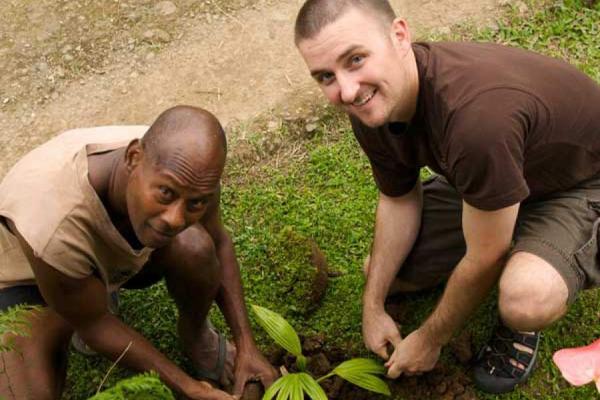Dressed in faded saffron robes, Swamiji Yogaratna starts the evening chant by lighting candles and sandalwood incense. “Let your light shine, shine, shine,” she sings. Around her, the roomful of backpackers and spiritual seekers join in the Sanskrit chants as best they can. For newcomers to Shakar Prasad, the opening “om” is about as much as they can muster, before stumbling over the “poornamudachyate” that follows.
Located just minutes away from the palm-fringed beaches of India’s Karnataka state, Shankar Prasad is a place where Hindu spiritual disciplines are pursued. In a country where gods like Shiva and Ganesh have the cachet of pop culture icons, staying at an ashram allows visitors to learn about India’s customs, to mingle with swamis and sadhus, and to volunteer, which gives their travels a deeper purpose.
Popularized by Elizabeth Gilbert’s memoir, Eat, Pray, Love, there are countless ashrams throughout India open to travellers, which vary in focus, amenities and routines. However, one thing holds true of most. “It’s a good way to learn about Indian spirituality in an experiential and real way,” explains Swamiji, the founder of Shankar Prasad.
Spirituality 101
On this December evening, Swamiji has invited a guest who livens up the post-chanting discussion: a holy man or Sadhu, who has renounced all material things and lives largely off milk. After taking off his robes, he sits at the head of the room, belly exposed. Animated, he talks about his life’s philosophy as a Naga (naked) monk, and the symbolic importance of the cobra. He imitates the cobra’s strike with his hand while making a sharp hissing sound. When someone in the room yawns, he stops what he’s doing and accuses the yawner of not doing their breathing exercises.
Despite the chastising from the Sadhu, Shankar Prasad is considered a “soft or “halfway” ashram because the rules are less strict than other ashrams. For this reason, it attracts visitors who are newer to meditation and yoga.
Bryce Suttie is one of these visitors. The British Columbian went to Shankar Prasad because he wanted an introduction to meditation and felt its birthplace was the perfect place to learn. “I was taught tools for focusing the mind that I never knew were possible,” he says. “I’ll be practicing for the rest of my life.”
Discovering inner peace through volunteerism
Swamiji Yogaratna is a firm believer in karma yoga—the practice of engaging in acts of kindness. At Shankar Prasad, every day starts with a rise and shine bell at 5:45 am, followed by half an hour of chanting. After yoga and breakfast, visitors take part in daily chores and volunteer work.
Volunteering is a common element of ashram stays. In addition to helping visitors understand the principles and concepts of Hinduism, it provides opportunities to interact with the local community. By bridging this cultural gap, visitors can gain a better understanding of how Hinduism affects customs and daily life.
As a short-term volunteer, karma yoga is likely to include cleaning the ashram, gardening, and helping in the kitchen to join the chapati (flatbread) production line. Longer-term volunteers are presented with meaningful community project opportunities, such as helping at the pre-school (where children gain English-language skills), with a women’s empowerment group, or garden management. In addition, during a monthly clean-up, ashram visitors remove garbage that chokes the area's beaches and waterways.
For newcomers, the opening “om” is all they can muster, before stumbling over the “poornamudachyate” that follows.
For all of the projects, Swamiji consulted with the local community—where 24 per cent of the population lives below the poverty line—to better understand their needs. However, the projects also help travellers to better understand themselves. “I hope people connect to the practices and attitudes that visitors are encouraged to cultivate, like gratitude and unconditional love,” says Swamiji.
However, ashrams aren’t for everyone—most have rigid schedules, and offer only vegetarian food, basic accommodation and limited Internet. At times, staying at an ashram can also feel like a crash course in spirituality.
American volunteer Lauren Johnson admits that chanting with the group didn't always resonate. But since leaving, she’s embraced the practice. “It’s a lot more effective than quiet meditation, because it’s really easy to start ruminating when you’re silent. When you’re chanting it feels like you’re physically clearing your mind,” she says.
Swamiji, who was born to Australian parents and raised in India, is well aware that visitors may not arrive with spiritual backgrounds. Instead, she encourages travellers to find spirituality through working and spending time with one another. “People can discover what spirituality is without religion; they can discover simple spirituality of the modern world,” she says.
This article originally appeared in the Spring 2016 issue of Verge.
Add this article to your reading list




